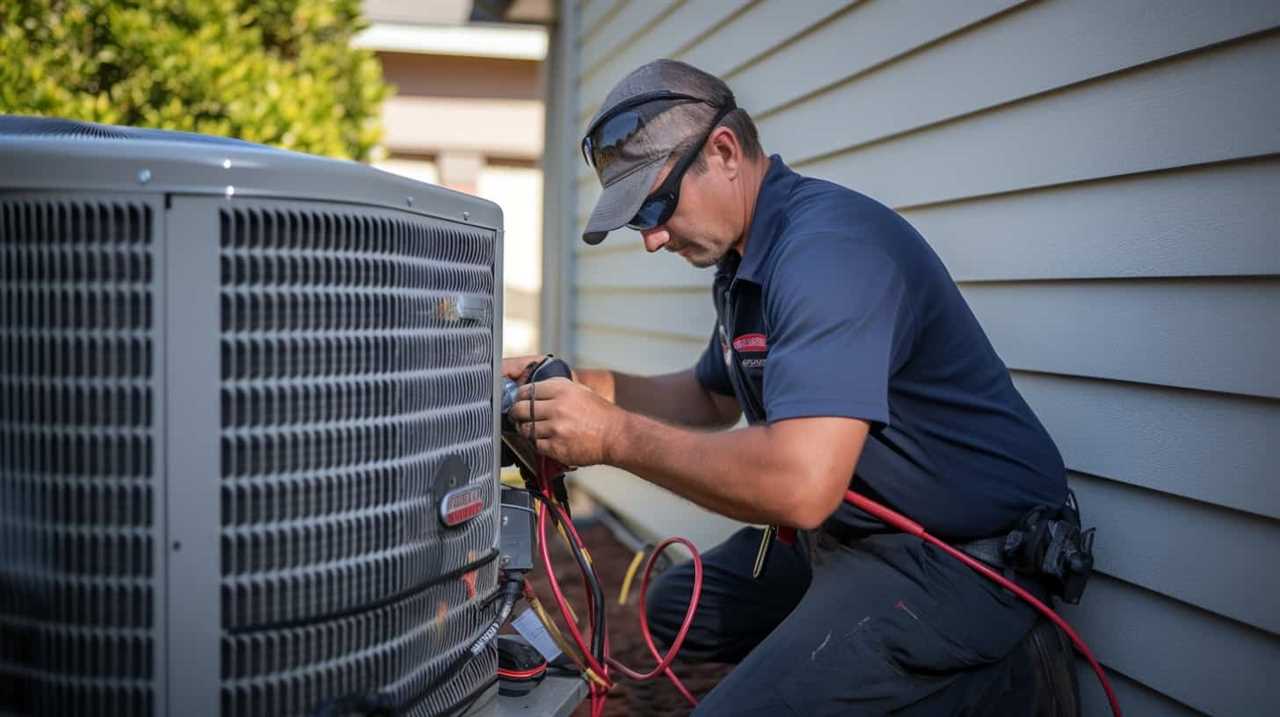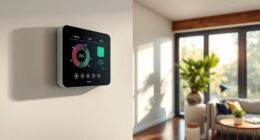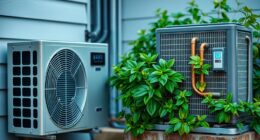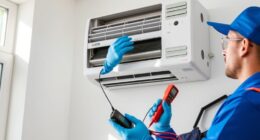Are you ready to discover the hidden wonders of climate control with a heat pump? Join us as we delve into the secret features that turn this technology into a groundbreaking tool.
From the basics to advanced features, we’ll explore it all. Our goal is to empower you with the knowledge you need to optimize your heat pump’s performance and enhance energy efficiency.
So sit back, relax, and let us guide you through the fascinating world of heat pump climate control.
Key Takeaways
- Proper installation and regular maintenance are essential for efficient heat pump climate control.
- Heat pumps transfer heat using refrigerant and can provide both heating and cooling.
- Factors such as temperature settings, insulation, and zoning affect the performance of heat pumps.
- Heat pumps enhance energy efficiency by transferring heat instead of generating it, offering precise temperature control and customized comfort.
The Basics of Heat Pump Climate Control
Let’s start by understanding the basic principles of heat pump climate control. Heat pump installation is a complex process that requires careful planning and attention to detail. It involves the proper sizing and placement of the heat pump unit, as well as the installation of the necessary ductwork and electrical connections.

Troubleshooting heat pump issues is also an important aspect of maintaining efficient climate control. Common problems include insufficient heating or cooling, strange noises, and poor airflow. By understanding the basics of heat pump operation, such as how refrigerant cycles work and how the unit transfers heat, technicians can quickly diagnose and resolve issues.
Regular maintenance, including cleaning and inspecting the unit, can also help prevent problems and ensure optimal performance.
Understanding Heat Pump Technology for Climate Control
We can understand heat pump technology for climate control by examining how it uses refrigerant and transfers heat. Heat pumps are designed to transfer heat from one place to another using a refrigerant as the medium.
The refrigerant absorbs heat from the air, water, or ground and transfers it to the indoor space, providing heating. In cooling mode, the heat pump extracts heat from the indoor space and releases it outside.

This process of heat transfer is highly efficient and can provide significant energy savings compared to traditional heating and cooling systems. Recent advancements in heat pump technology have further improved their efficiency and performance. These advancements include variable speed compressors, smart controls, and advanced refrigerants.
The benefits of heat pump climate control include reduced energy consumption, lower utility bills, improved indoor air quality, and environmental sustainability.
Factors to Consider for Effective Heat Pump Climate Control
When it comes to effective heat pump climate control, there are several factors to consider.
First and foremost, setting the temperature to an optimal level is crucial for both comfort and energy efficiency.

Additionally, implementing energy-saving tips such as proper insulation, regular maintenance, and utilizing programmable thermostats can greatly enhance the performance of your heat pump system.
Optimal Temperature Settings
Achieving optimal temperature settings is crucial for effective heat pump climate control. By carefully adjusting the temperature control, you can ensure comfort while minimizing energy consumption. Here are four factors to consider for setting the optimal temperature:
Season: Adjust the temperature settings based on the season. In winter, set the temperature lower when you’re away and higher when you’re home. In summer, set the temperature higher when you’re away and lower when you’re home.
Occupancy: Consider the number of people in the space. More occupants generate heat, so you may need to lower the temperature slightly to maintain comfort.

Insulation: Evaluate the insulation of your home or building. Proper insulation reduces heat loss or gain, allowing you to set the temperature at a more energy-efficient level.
Personal preferences: Take into account individual preferences. Some people prefer cooler temperatures, while others prefer warmer ones. Finding a balance can help satisfy everyone’s needs.
Energy Efficiency Tips
To maximize energy efficiency in heat pump climate control, it’s important to consider factors such as insulation and occupancy.
Implementing energy saving strategies and reducing electricity consumption can significantly contribute to a more efficient heat pump system.

One of the key factors to consider is insulation. Proper insulation prevents heat loss or gain, ensuring that the heat pump operates at its optimal level. Insulating the walls, floors, and attic can minimize the need for the heat pump to work harder, thereby reducing electricity consumption.
Another important factor is occupancy. Adjusting the temperature settings based on occupancy can lead to substantial energy savings. For instance, during periods of low occupancy, setting the temperature slightly lower or higher can help reduce unnecessary energy usage.
Regular maintenance and servicing of the heat pump system is also crucial. Cleaning or replacing air filters, checking refrigerant levels, and inspecting ductwork can improve the system’s efficiency and reduce energy consumption.
How Heat Pumps Enhance Energy Efficiency in Climate Control
When it comes to enhancing energy efficiency in climate control, heat pumps offer a range of benefits.
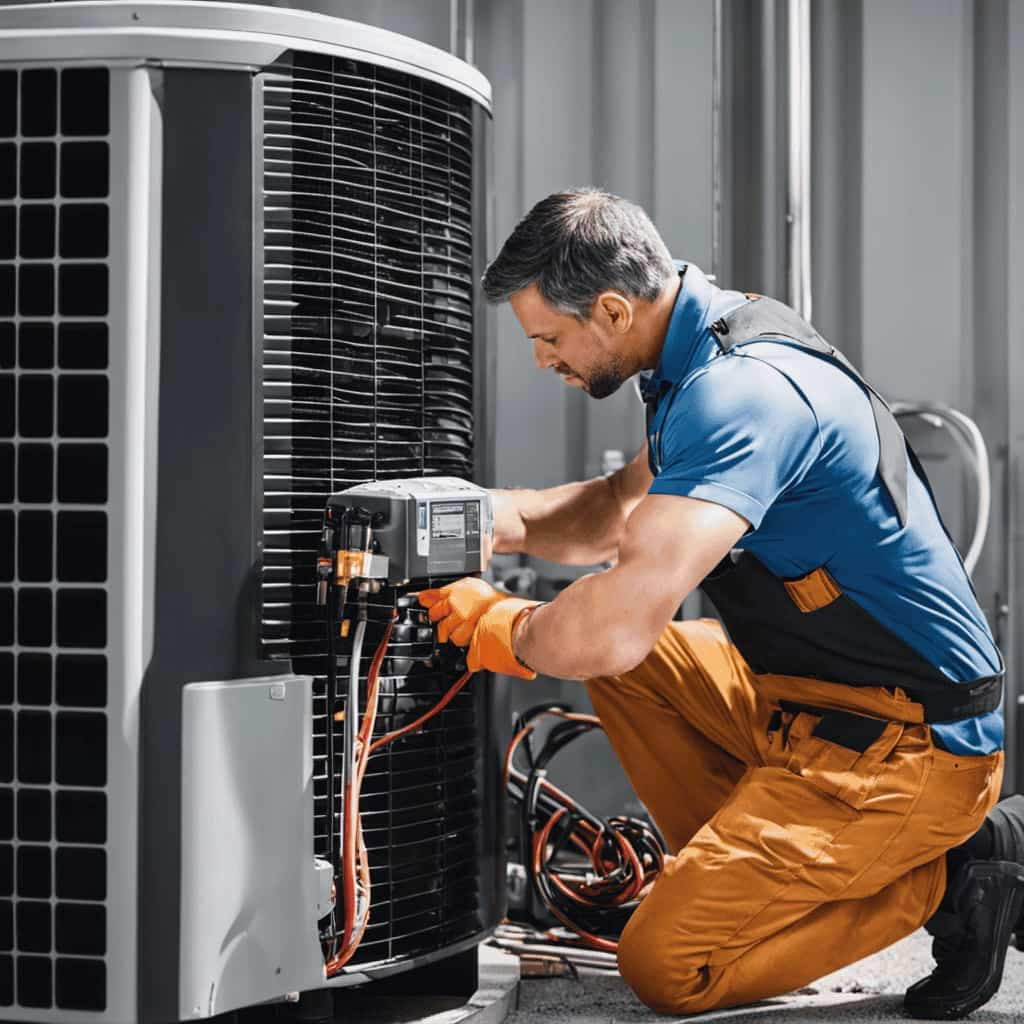
Firstly, heat pumps are designed to transfer heat rather than generate it, resulting in significant energy savings. This is achieved through the use of refrigerant cycles that absorb heat from the outdoor air or ground and transfer it indoors, providing efficient heating and cooling.
Additionally, heat pumps can enhance climate control efficiency by offering precise temperature control and zoning capabilities, allowing for customized comfort and reduced energy consumption.
Energy-Saving Benefits of Heat Pumps
We can significantly reduce energy consumption by using heat pumps in climate control. Heat pumps offer several energy-saving benefits that make them cost-effective solutions for maintaining indoor comfort.
Here are four key advantages of heat pumps:

Efficient heat transfer: Heat pumps transfer heat from the outside air or ground to heat or cool the indoor space, using minimal electricity. This process consumes less energy than traditional heating or cooling systems.
Dual functionality: Heat pumps can provide both heating and cooling, eliminating the need for separate systems and reducing overall energy usage.
Energy recovery: Heat pumps can recover and reuse waste heat from various sources, such as ventilation systems or hot water, further increasing energy efficiency.
Smart controls: Many heat pumps come with advanced control systems that optimize energy usage based on the specific needs of the building, reducing energy waste.

Increased Climate Control Efficiency
Our heat pumps improve energy efficiency in climate control by increasing the overall efficiency of the system. This increased efficiency leads to significant energy savings for homeowners.
Heat pumps work by transferring heat from one location to another, rather than generating heat like traditional heating systems. By utilizing smart thermostat integration, heat pumps can intelligently regulate the temperature in a home, optimizing energy usage based on specific needs and preferences.
Smart thermostats can learn the homeowners’ schedule and adjust the temperature accordingly, saving energy when the house is unoccupied and ensuring comfort when the occupants are present.
Additionally, heat pumps can be paired with zoning systems, allowing different areas of the home to be heated or cooled independently, further enhancing energy efficiency.

The integration of smart thermostats and zoning systems with heat pumps maximizes climate control efficiency, resulting in increased energy savings for homeowners.
Optimizing Heat Pump Performance for Climate Control
To achieve optimal performance for climate control, we must focus on maximizing efficiency and minimizing energy consumption. Here are four strategies to help optimize heat pump performance:
Regular maintenance: Ensure that the heat pump is clean and free from debris. Clean or replace air filters regularly to ensure proper airflow and prevent strain on the system.
Proper thermostat settings: Set the thermostat to an energy-saving temperature that still provides comfort. Utilize programmable thermostats to adjust the temperature based on occupancy patterns.

Airflow optimization: Ensure that vents and registers aren’t obstructed by furniture or other objects. Proper airflow allows the heat pump to distribute conditioned air evenly throughout the space.
Troubleshooting common issues: Familiarize yourself with common heat pump issues such as inadequate heating or cooling, unusual noises, or leaks. Addressing these issues promptly can prevent further damage and ensure efficient operation.
Tips and Tricks for Maintaining Heat Pump Climate Control
For optimal maintenance of heat pump climate control, it’s essential to follow these tips and tricks.
Regular heat pump troubleshooting and maintenance can help ensure the efficient and reliable operation of your system.

Start by checking the air filters regularly and cleaning or replacing them as needed. Clogged filters can restrict airflow and reduce the system’s efficiency.
Additionally, inspect the outdoor unit and remove any debris or vegetation that may obstruct airflow.
Check the refrigerant levels and ensure they’re within the manufacturer’s recommended range.
Inspect the indoor and outdoor coils for any dirt or debris buildup and clean them if necessary.

Finally, regularly schedule professional maintenance checks to identify any potential issues and address them promptly.
Exploring Advanced Features for Heat Pump Climate Control
We can enhance our heat pump climate control system by exploring its advanced features, such as programmable thermostats and smart home integration. These advanced technologies offer a range of smart control features that can greatly improve the efficiency and effectiveness of our climate control system.
Here are four key advanced features to consider:
Programmable Thermostats: These allow us to set customized temperature schedules for different times of the day, optimizing energy usage and ensuring comfort when needed.

Smart Sensors: These sensors can detect occupancy and adjust temperature settings accordingly, saving energy when no one is present in the room or building.
Remote Access: With smart home integration, we can control our heat pump system from anywhere using a smartphone or tablet, allowing us to adjust settings even when we aren’t at home.
Energy Monitoring: Advanced heat pump systems can provide real-time energy usage data, helping us track and optimize our energy consumption.
Frequently Asked Questions
Can a Heat Pump Be Used for Both Heating and Cooling Purposes?
Yes, a heat pump can be used for both heating and cooling purposes. It works by transferring heat from one area to another, using minimal energy to achieve efficient climate control.

Are Heat Pumps Suitable for All Types of Climates?
Heat pumps are suitable for all climates. Their efficiency and energy savings make them a great choice. We’ve uncovered the secrets of heat pump climate control and want to share them with you.
How Long Does a Heat Pump Typically Last Before It Needs to Be Replaced?
Heat pump maintenance is crucial to ensure its longevity. Signs of a failing heat pump include reduced heating/cooling capacity, strange noises, and frequent breakdowns. Regular inspections and timely repairs can extend a heat pump’s lifespan.
Can a Heat Pump Be Installed in an Existing HVAC System?
Yes, a heat pump can be installed in an existing HVAC system. It offers numerous benefits such as energy efficiency and cost savings. Our team can assist you in installing a heat pump to enhance your climate control system.
Are There Any Government Incentives or Rebates Available for Installing a Heat Pump for Climate Control?
Yes, there are government incentives and heat pump rebates available for installing a heat pump for climate control. These incentives and rebates help offset the cost and encourage the adoption of energy-efficient heating and cooling systems.

Are There Any Myths About Heat Pump Technology That Need to be Debunked?
Are There Any Myths About Heat Pump Technology That Need to be Debunked? Heat pump technology myths have circulated for years, prompting confusion and misinformation. One common myth suggests that heat pumps are inefficient in cold climates, but advancements have made them suitable for colder temperatures. Another myth claims that heat pumps only provide cooling, but they are capable of both cooling and heating, offering year-round comfort. It’s important to debunk these heat pump technology myths to promote accurate understanding and encourage adoption of this energy-efficient solution.
Conclusion
In conclusion, heat pumps offer an efficient and effective solution for climate control. With their advanced technology and energy-saving features, heat pumps can help reduce energy consumption by up to 50%. This means not only a more comfortable indoor environment but also significant cost savings in the long run.
By properly maintaining and optimizing heat pump performance, users can enjoy the benefits of climate control while minimizing their environmental impact.





